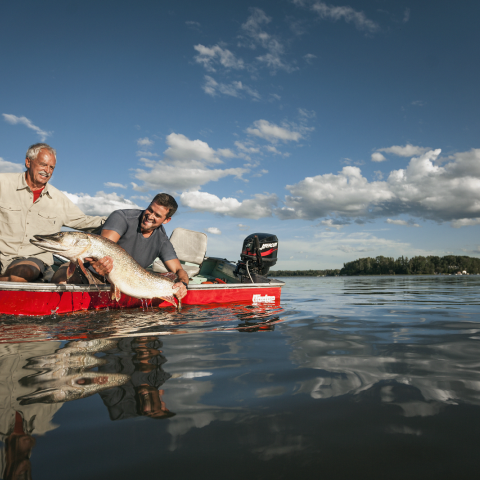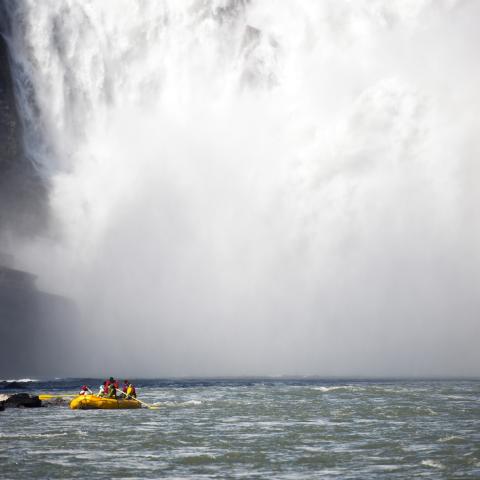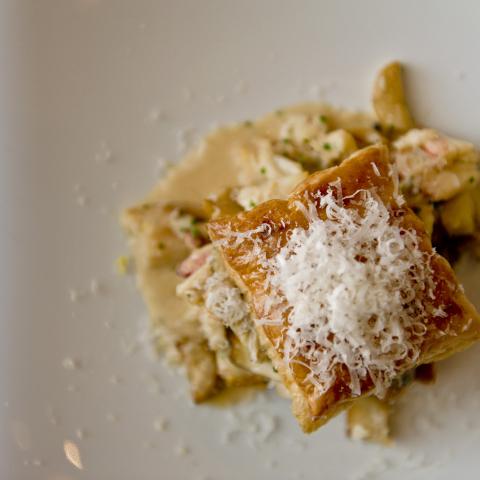sa • vor /ˈsāvər/ verb From the Old French (naturally), “savourer.” To taste, breathe in, appreciate, especially with heightened awareness, as when savouring the delights of Québécois food and drink.
Author: Joe Cutts
I admire people who have skied Québec’s Gaspé Peninsula. It’s wild and remote, way over on the south shore of the great St. Lawrence River. No lifts, no resorts. Drive for hours, sweat your butt off earning every turn, chow some ramen, and crash in a van.
I hear the Gaspésie is beautiful, and skiing there sure fits into the Québecois spirit of squeezing fun out of every last snowflake. For me, the trip would lack sufficient immersion in Quebec culture, especially the part I love best. I respect hunger for adventure, but my hunger is for food and in Quebec, that is a distraction best surrendered to.
So I admit that there have been some cold Quebec midwinter days when I was supposed to be broadening my ski horizons but was instead holed up in some warm café, chatting with the friendly locals over a cappuccino and tarts, or tucking into a plate of poutine at a slopeside microbrewery, or prowling the centuries-worn cobblestones of Québec City’s Basse-Ville in search of the next tidy, fragrant fromagerie/boulangerie/pâtisserie/charcuterie. Naughty ski writer: instead of a reporter’s notebook crammed with valuable tips and information, I’d return home with a trunkful of exotic comestibles.
You don’t go to Quebec just for the skiing. You go because you’re a curious world traveller, a connoisseur of cultures. If you live in Eastern Canada, Quebec might not be a far-flung travel destination, but just because you get there by car doesn’t make it any less exotic. Especially in winter.
For the natives—Les Québécois—do love their winter. There’s mischievous creativity in their zeal for cold-weather fun, much of it warmly lubricated with spirits and stoked with fine food. The world’s biggest winter party? They invented that: Québec City’s zany, week-long celebration, Carnival. They invented Ski-Doos and glissades and crashed ice. Which reminds me: bring skates. There are miles of Zambonied bike paths winding through winter woods and along lakeshores.
The ski culture has its own style, of course. Les Québécois love their Rossis and Salomons. They dress well for the slopes. There’s even a distinctive ski technique, held over from the days of week-long lessons in the Laurentians—fluid, feet close, arms free to express themselves (you know it when you see it at Stowe or Jay). Racing is still held in esteem—visiting clubs love the early-season gate training at Mont Sainte-Anne; Le Massif trucked enough fill to raise its summit high enough for FIS speed-event homologation. And yet the Québecois were early adopters and innovators of park skiing.
Just north of Montréal, the sound of English fades and the Laurentians rise in a chain of resorts—a dozen or so in less than 50 kilometres—and charming, slopeside villages, with crown-jewel Tremblant at the end. This is the cradle of Canadian skiing, and history abounds, from Jackrabbit Johannsen to Fred Pabst. Montréalers have been skiing here since the ’30s, so they’ve had lots of practice getting the whole après-ski thing perfected. It shows. At places like Sommet Saint-Sauveur (less than an hour from Montréal and home to some of the best night skiing in Canada), Mont Blanc (perfect for families), and of course Tremblant, you can expect every amenity, not to mention every kind of non-skiing activity.
From Montréal, follow the left bank of the widening St. Lawrence River northward, downstream, to ancient Québec City and its trio of quintessentially Québecois resorts. Now you’re in the heart of Quebec. The 400-year-old fortress city, a UNESCO World Heritage Site, is as provincial as Montréal is cosmopolitan, and all the richer for it. Your dedication to skiing will be challenged by the great food and fascinating history, but the slopes nearby never disappoint. Close by are Mont-Sainte-Anne, the early-season race factory, and Stoneham, the freestyle hotbed that gave the world JP Auclair and the Canadian Air Force. A little farther downstream is one of the East’s most extraordinary resorts. At Le Massif, where you park up top and descend 2,500+ vertical feet of shockingly good terrain toward the shore, the St. Lawrence, 10 miles wide, is a constant companion. Skiing in full view of ocean-going tankers and freighters leaves a lasting impression of your Quebec ski safari. To go with the extra couple of pounds.
Sleep: Tremblant abounds with four-star accommodations, including the Fairmont and the Westin. In the Townships, look for rustic auberge with an ambitious chef, like Manoir Hovey in North Hatley. In Québec City, it’s hard to decide between the majestic Le Château Frontenac or a hotel with a view of it.
Eat: Every restaurant, bistro, microbrewery, and ski lodge will blow your mind. Make time for food shops, too; even the supermarkets are exciting.
Après: The Québecois correctly view skiing as an excuse to après, so options abound. The party at Tremblant makes Killington look like church camp, as you’ll see most evenings at, say, Le P’tit Caribou. In the Townships, the Sutton’s Bar Le Tucker is a lively favorite for good old boots-on conviviality with fellow skiers. Québec City is just the world’s most interesting ski town.
Don’t miss: It’s Quebec—if you bring skates, you’ll find ice, maybe even a pick-up game. In Québec City, you can skate the historic Plains of Abraham battlefield. At Domaine de la Forêt Perdue, between Montréal and Québec City, you can zoom through the woods on glass-smooth paths.
Getting There
A trip to Quebec feels very much like going to a different and exotic country in the best way possible.









